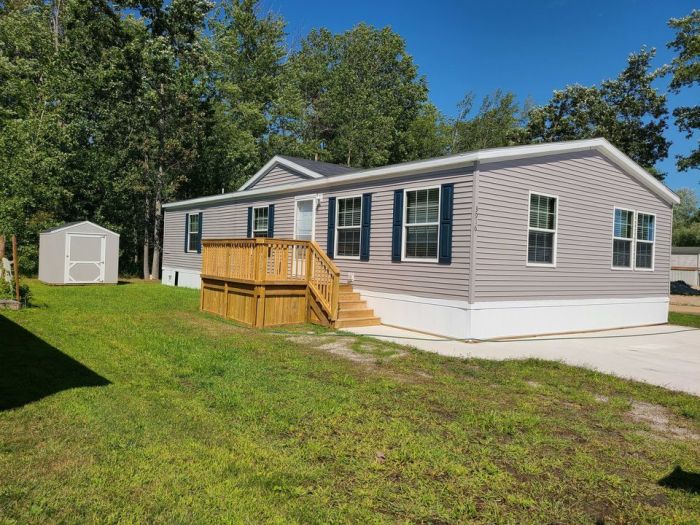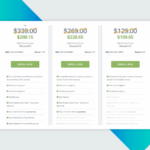10 Things to Know Before Buying a Mobile Home: The allure of affordable housing often leads prospective buyers to consider mobile homes. However, this seemingly simple purchase comes with complexities often overlooked. From understanding the diverse types of mobile homes available and navigating the intricacies of park living to mastering the financial aspects and legal considerations, the journey to mobile home ownership requires thorough preparation.
This guide unravels the essential knowledge needed to make an informed decision, ensuring a smooth and successful transition into mobile home living.
This comprehensive guide breaks down the key factors you must consider before taking the plunge. We’ll explore everything from the various types of mobile homes and the importance of choosing the right park to understanding financing options, conducting thorough inspections, and navigating the legal and financial aspects of ownership. We’ll also delve into the ongoing costs, including utilities, maintenance, and potential hidden expenses, to ensure you’re fully prepared for the responsibilities of mobile home ownership.
Understanding Mobile Home Types and Sizes
Choosing the right mobile home involves careful consideration of its type and size to best suit your needs and budget. Understanding the variations in design and dimensions is crucial for making an informed decision. This section will explore the different types of mobile homes available, their typical dimensions, and common features, allowing you to better assess your options.
Mobile Home Types and Dimensions
Mobile homes are categorized primarily by their width: single-wide, double-wide, and sometimes triple-wide. Single-wides are generally narrower and shorter, suitable for smaller families or individuals. Double-wides, as the name suggests, are twice the width and often longer, providing significantly more living space. Triple-wides are less common but offer the most expansive floor plans. The length can vary greatly depending on the manufacturer and specific model.
It’s important to note that these dimensions exclude any additions or attached structures.
Comparison of Mobile Home Types
The following table provides a general comparison of different mobile home types. Keep in mind that prices and features can fluctuate based on location, manufacturer, and the level of customization. These are average values and may not reflect every single model on the market.
| Manufacturer | Typical Size (approx. sq ft) | Average Cost Range (USD) | Common Features |
|---|---|---|---|
| Example Manufacturer A | Single-wide: 600-800; Double-wide: 1200-1600 | $50,000 – $150,000 | Open floor plan, basic kitchen appliances, 2-3 bedrooms, 1-2 bathrooms |
| Example Manufacturer B | Single-wide: 700-900; Double-wide: 1400-1800 | $60,000 – $180,000 | Upgraded kitchen appliances, larger bedrooms, optional features like a fireplace or sunroom |
| Example Manufacturer C | Double-wide: 1600-2000; Triple-wide: 2400-3000+ | $100,000 – $300,000+ | Luxury finishes, multiple bathrooms, large living areas, potential for customized floor plans |
Mobile Home Floor Plan Variations and Features
Floor plans vary widely, offering diverse options to accommodate various lifestyles and family sizes. Some models feature open-concept layouts, ideal for entertaining, while others prioritize separate spaces for privacy. Features can include vaulted ceilings, walk-in closets, dedicated laundry rooms, and even attached garages or carports, significantly impacting the overall cost and living experience. Consider the number of bedrooms and bathrooms needed, along with desired living space and storage.
Examples of Mobile Home Layouts for Different Family Sizes
A single-wide mobile home might suit a single person or a small couple, offering a cozy and efficient living space. A double-wide is better suited for families with children, offering multiple bedrooms and more living space. For larger families or those who frequently entertain, a triple-wide or a double-wide with additions might be a more suitable option. A family with elderly parents might prefer a single-story layout with easy access and minimal stairs.
Conversely, a young couple might prefer a more modern design with an open floor plan and a minimalist aesthetic.
Location, Location, Location
Choosing the right mobile home park is as crucial as selecting the home itself. The park’s environment significantly impacts your lifestyle, property value, and overall living experience. Thorough research is paramount to avoid future headaches and ensure a comfortable and secure living situation. Factors such as location, amenities, and community atmosphere should be carefully considered before making a purchase.
Factors to Consider When Evaluating a Mobile Home Park
Evaluating a mobile home park requires a comprehensive assessment of various factors. A good park offers a balance between affordability, amenities, and a welcoming community. Prospective buyers should investigate the park’s history, its management style, and the overall condition of the community. Critically examine the park’s rules and regulations, paying close attention to pet policies, visitor restrictions, and any potential limitations on home modifications.
Proximity to essential services, such as grocery stores, hospitals, and public transportation, also plays a vital role in the overall convenience and quality of life.
Types of Mobile Home Parks and Their Characteristics
Different mobile home parks cater to diverse lifestyles and preferences. Understanding the pros and cons of each type allows buyers to make informed decisions based on their individual needs.
| Park Type | Pros | Cons | Example Scenario |
|---|---|---|---|
| Age-Restricted | Quiet, peaceful environment; strong sense of community among similar-aged residents; often well-maintained. | Limited diversity; may not be suitable for families with young children; potential social isolation for newcomers. | A 55+ community might offer planned activities like shuffleboard tournaments and book clubs, fostering a close-knit atmosphere. However, younger families would find it unsuitable. |
| Family-Oriented | Welcoming to children; often includes playgrounds and recreational areas; strong sense of community among families. | Can be more noisy; potentially higher density; may lack the tranquility of age-restricted communities. | A park with a dedicated children’s play area and organized family events would appeal to families but might be less appealing to those seeking a quieter environment. |
| Resort-Style | Luxurious amenities; often includes swimming pools, fitness centers, and clubhouses; higher level of maintenance and landscaping. | Significantly higher lot rent; potentially stricter rules and regulations; may feel less like a “home” and more like a resort. | A park boasting a golf course, swimming pool, and a community center would offer a high-end lifestyle, but this comes at a considerable cost. |
Park Ownership Versus Lot Rent
Understanding the difference between owning the mobile home and renting the land is crucial. In most cases, you own the mobile home itself, but you pay rent to the park for the land your home sits on. This lot rent can fluctuate and increase over time, impacting your overall monthly expenses. Some parks offer the option to purchase the land, which eliminates future rent increases but significantly increases the initial investment.
Thoroughly investigate the park’s history of rent increases and any potential future increases before committing to a purchase. This long-term financial commitment must be factored into your budget. A sudden increase in lot rent can significantly impact a homeowner’s financial stability. For example, a 10% increase in a $500 monthly lot rent represents a $50 increase, impacting the household budget.
Financing and Budgeting for Your Mobile Home Purchase

Securing financing and establishing a realistic budget are crucial steps in the mobile home buying process. Understanding your financial options and anticipating ongoing costs will ensure a smooth transition into mobile home ownership and prevent unforeseen financial burdens. This section Artikels different financing avenues and provides a practical guide to budgeting for your new home.
Mobile Home Financing Options
Purchasing a mobile home offers diverse financing options, catering to various financial situations. Cash purchases provide immediate ownership, while loans offer flexibility for those requiring financing. Cash purchases eliminate interest payments and associated fees, resulting in significant long-term savings. However, this requires substantial upfront capital. Loans, on the other hand, allow buyers to spread the cost over time, making mobile home ownership accessible to a wider range of buyers.
Several loan types are available, including conventional mortgages, manufactured home loans, and personal loans. Each option has unique terms, interest rates, and eligibility criteria. It’s advisable to shop around and compare offers from multiple lenders to secure the most favorable terms. Pre-qualification is recommended to determine your borrowing power before beginning your search.
Creating a Realistic Mobile Home Budget
Developing a comprehensive budget is essential for responsible mobile home ownership. This budget should encompass not only the initial purchase price but also ongoing expenses. A step-by-step approach is recommended:
- Determine the Purchase Price: This includes the cost of the mobile home itself, plus any applicable taxes and fees.
- Calculate Down Payment: A larger down payment typically leads to lower monthly payments and potentially a better interest rate on a loan.
- Estimate Closing Costs: These can include appraisal fees, title insurance, and loan origination fees. Expect these costs to range from 2% to 5% of the loan amount.
- Factor in Ongoing Expenses: This is crucial and often overlooked. Include property taxes, homeowners insurance, lot rent (if applicable), utilities (electricity, water, gas, internet), maintenance and repairs, and potential property association fees.
- Establish a Contingency Fund: Unexpected repairs and maintenance are inevitable. A dedicated savings account can help mitigate the financial impact of these unforeseen events. Aim for at least 1-3 months’ worth of ongoing expenses.
- Review Your Budget Regularly: Life circumstances change. Regularly reviewing and adjusting your budget ensures financial stability.
Financial Implications: Buying vs. Renting a Mobile Home
The decision to buy or rent a mobile home hinges significantly on financial considerations. Both options have distinct advantages and disadvantages.
- Buying: Offers long-term equity building, potential appreciation, and tax deductions (interest payments may be deductible). However, it demands a significant upfront investment, including a down payment and closing costs, plus ongoing maintenance and repair expenses.
- Renting: Requires lower upfront costs, with predictable monthly payments. However, rent payments do not build equity, and rent can increase unpredictably over time. There is also limited control over maintenance and renovations.
For example, let’s consider a hypothetical scenario: A mobile home costs $80,000. Buying with a 10% down payment ($8,000) and a 30-year loan at 6% interest would result in significantly higher monthly payments than renting a comparable unit for $1,000 per month. However, over the long term, the buyer builds equity and eventually owns the property outright. Conversely, the renter continues to pay rent, with no ownership benefit.
The optimal choice depends on individual financial circumstances, long-term goals, and risk tolerance.
Inspecting the Mobile Home
A thorough inspection is crucial before purchasing a used mobile home. Overlooking potential problems can lead to costly repairs down the line, significantly impacting your investment. This section details a comprehensive checklist and the importance of professional assistance in the inspection process.
Pre-Purchase Inspection Checklist
A systematic inspection should cover structural integrity, plumbing, electrical systems, and appliances. Ignoring any area can leave you vulnerable to unexpected expenses. The following checklist provides a starting point for your assessment:
| System | Potential Problems | Inspection Steps | Solutions/Considerations |
|---|---|---|---|
| Structural | Cracks in walls or foundation, water damage, sagging floors, roof leaks | Visually inspect all walls, floors, ceilings, and the roof for damage. Check for signs of pest infestation. Examine the frame and undercarriage for rust or damage. | Repair cracks, address water damage, replace damaged sections of flooring or roofing, treat pest infestations, consider replacing severely rusted components. Significant structural issues may make the home unsuitable for purchase. |
| Plumbing | Leaks, low water pressure, clogged drains, malfunctioning toilets | Check all faucets, toilets, showers, and sinks for leaks. Run water to check pressure. Flush toilets and check for proper drainage. Inspect pipes for corrosion or damage. | Repair or replace leaky faucets, address low water pressure issues (possibly by checking the water pump), unclog drains, repair or replace malfunctioning toilets, replace damaged pipes. |
| Electrical | Faulty wiring, non-functional outlets, outdated electrical panel | Test all outlets and light switches. Check the electrical panel for signs of damage or overloading. Look for frayed or damaged wiring. | Rewire faulty sections, replace non-functional outlets, upgrade the electrical panel if necessary. This is best handled by a qualified electrician. |
| Appliances | Malfunctioning appliances (refrigerator, oven, washing machine, etc.) | Test all appliances to ensure they are functioning correctly. | Repair or replace malfunctioning appliances. Consider negotiating the price based on the cost of repairs or replacements. |
Professional Mobile Home Inspection
Engaging a qualified professional inspector is highly recommended. A professional brings expertise and unbiased evaluation, identifying issues you might miss. A professional inspection typically includes a detailed report outlining findings, potential safety hazards, and estimated repair costs. This report can be invaluable during price negotiations.
Negotiating the Price Based on Inspection Findings
The inspection report serves as a powerful tool for negotiating the purchase price. If the inspection reveals significant problems, you can use the report to justify a price reduction. For example, if the report indicates $5,000 in necessary repairs, you can request a price reduction of a similar amount. Always approach negotiations professionally and respectfully, presenting the inspection findings as objective evidence supporting your request.
Understanding the Legal Aspects of Mobile Home Ownership
Purchasing a mobile home involves more than just finding the right unit; it requires a thorough understanding of the legal framework governing ownership. Unlike traditional houses, mobile home ownership often involves two distinct aspects: ownership of the home itself and ownership of the land on which it sits. Navigating these legal nuances is crucial for a smooth and successful purchase.Owning the home and owning the land are legally separate entities.
You can own the mobile home but lease the land it sits on, a common arrangement in mobile home parks. This means you’re responsible for maintaining and insuring your mobile home, but the park owner manages the land, including utilities and amenities. Alternatively, you can own both the home and the land, providing more control but potentially higher upfront costs and responsibilities.
Understanding this distinction is paramount in determining your financial obligations and long-term ownership rights.
Ownership of the Mobile Home and Land
The legal distinction between owning the mobile home and owning the land significantly impacts your rights and responsibilities. Owning just the mobile home, while less expensive initially, means you are essentially renting the land from the park owner. This arrangement often comes with a monthly lot rent, which covers land usage, utilities, and park maintenance. In contrast, owning both the home and the land provides complete control and eliminates lot rent, but necessitates handling all land-related maintenance and taxes.
Choosing between these options depends on your financial situation, long-term goals, and risk tolerance. For example, a buyer prioritizing affordability might choose to lease the land, while someone seeking long-term stability and potential appreciation might prefer to own the land as well.
Reviewing Park Rules and Regulations
Before committing to a purchase, meticulously review the park’s rules and regulations. These documents Artikel crucial details concerning pet policies, property maintenance standards, guest restrictions, and permitted modifications to your mobile home. Failure to comply with these rules can result in fines or even eviction. Some parks have strict rules regarding the age and condition of mobile homes, potentially impacting your ability to sell or upgrade in the future.
A thorough review allows you to make an informed decision, ensuring the park aligns with your lifestyle and expectations. For instance, if you own a pet, verify the park’s pet policy before purchasing to avoid future conflicts.
Transferring Ownership of a Mobile Home
Transferring ownership of a mobile home involves several legal steps, varying depending on whether you own the land or lease it. If you only own the mobile home, the transfer typically involves updating the title and registration with the relevant authorities. This process may involve completing paperwork and paying associated fees. If you own both the home and the land, the transfer will also involve transferring the land deed.
This process is similar to transferring ownership of a traditional house and usually involves a real estate attorney to ensure the legal process is correctly followed and that all necessary documents are filed correctly. In both scenarios, securing legal counsel to navigate the complexities of the transfer process is highly recommended.
Insurance and Property Taxes
Purchasing a mobile home involves more than just the initial purchase price; understanding the ongoing costs of insurance and property taxes is crucial for responsible budgeting. These expenses can significantly impact your overall financial commitment, varying widely depending on factors such as location, home value, and coverage levels. Failing to account for these costs can lead to unexpected financial strain.Property taxes and insurance premiums are significant ongoing expenses for mobile home owners.
These costs, alongside utility bills and potential maintenance, constitute the true cost of ownership beyond the initial investment. It’s essential to thoroughly research these figures before committing to a purchase.
Mobile Home Insurance Types
Mobile home insurance, unlike traditional homeowners insurance, often requires a more comprehensive approach. Standard homeowners insurance policies may not adequately cover mobile homes, which are often considered personal property rather than real estate, depending on their location. Therefore, understanding the specific coverage needed is paramount. Two primary types of insurance are generally necessary: homeowners insurance and liability insurance.
Homeowners insurance covers the structure of the mobile home itself against damage from events like fire, wind, or hail. Liability insurance protects you financially if someone is injured on your property. Additional coverage, such as flood insurance, might be necessary depending on the location of the mobile home.
Factors Influencing Property Taxes on Mobile Homes
Property taxes on mobile homes are determined by several factors. The assessed value of the mobile home, which is based on its size, age, condition, and features, is a key determinant. The local tax rate, which varies considerably from one municipality to another, also plays a significant role. Finally, the location of the mobile home, specifically whether it’s situated in a mobile home park or on privately owned land, will influence the tax assessment and potential exemptions.
Mobile homes located in parks often have separate assessments for the land and the home itself, leading to more complex tax calculations.
Examples of Insurance and Tax Cost Variations
Consider two hypothetical scenarios: A 1,200 square foot mobile home in rural Kansas might have an annual property tax of $800 and an annual homeowners insurance premium of $600. In contrast, a similar-sized mobile home in a coastal area of Florida, known for its higher property values and hurricane risk, might face annual property taxes exceeding $2,000 and homeowners insurance premiums potentially reaching $1,500 or more.
These differences highlight the substantial impact of location and perceived risk on both insurance and property taxes. It is vital to obtain quotes from multiple insurance providers and to check local tax rates before finalizing any mobile home purchase.
Utilities and Maintenance
Owning a mobile home presents unique considerations regarding utilities and maintenance. Understanding these aspects is crucial for budgeting effectively and ensuring the longevity of your investment. Factors like location, home size, and personal lifestyle significantly impact both utility consumption and maintenance needs.
Typical utility costs for a mobile home vary considerably depending on factors such as climate, home size, energy efficiency, and personal consumption habits. Electricity is often a major expense, especially in regions with extreme temperatures requiring significant heating or cooling. Water bills are influenced by usage and local water rates, while gas costs (if applicable for heating or cooking) will fluctuate with market prices and consumption levels.
For a 1,200 square foot mobile home in a moderate climate, you might expect monthly utility bills ranging from $200 to $400, but this is a broad estimate and can vary significantly.
Utility Cost Reduction Strategies
Several strategies can help significantly reduce utility costs. Implementing these measures not only saves money but also contributes to environmental sustainability.
- Install energy-efficient appliances: Replacing older appliances with Energy Star-rated models can drastically reduce electricity consumption. For example, a new energy-efficient refrigerator could save you $100 or more annually compared to an older model.
- Improve insulation: Proper insulation in walls, floors, and ceilings helps maintain consistent temperatures, reducing the burden on heating and cooling systems. Adding extra insulation can be a significant investment, but the long-term savings in energy costs can be substantial.
- Use energy-efficient lighting: Switching to LED bulbs is a simple and cost-effective way to reduce electricity usage. LEDs use significantly less energy than incandescent or CFL bulbs and last much longer.
- Practice water conservation: Installing low-flow showerheads and faucets can dramatically reduce water consumption and lower water bills. Simple habits like shorter showers also make a difference.
- Utilize programmable thermostats: Programmable thermostats allow you to automate temperature settings, reducing energy waste when the home is unoccupied.
Common Mobile Home Maintenance Tasks and Costs
Regular maintenance is essential for preserving the value and extending the lifespan of your mobile home. Ignoring maintenance can lead to costly repairs down the line.
| Maintenance Task | Estimated Cost | Notes |
|---|---|---|
| Roof Inspection and Repair | $300 – $3000+ | Costs vary greatly depending on the extent of repairs needed. |
| HVAC System Maintenance | $100 – $300 | Annual maintenance prevents major breakdowns. |
| Exterior Painting | $1000 – $3000+ | Cost depends on home size and paint quality. |
| Appliance Repair | $50 – $500+ | Costs vary depending on the appliance and the nature of the repair. |
| Plumbing Repairs | $50 – $500+ | Minor leaks can be inexpensive to fix, while major plumbing issues can be very costly. |
Resale Value and Depreciation
Understanding the resale value and depreciation of a mobile home is crucial for prospective buyers. While mobile homes offer an affordable entry point into homeownership, their value fluctuates differently compared to traditional stick-built homes. Factors influencing resale value must be carefully considered before making a purchase, as depreciation can significantly impact your investment.Depreciation in mobile homes, like other assets, refers to the decrease in value over time due to age, wear and tear, and obsolescence.
Unlike land, which typically appreciates in value, mobile homes depreciate, meaning their worth declines year after year. This depreciation is a significant factor to consider when budgeting for a mobile home purchase and planning for future resale. The rate of depreciation varies based on several key factors.
Factors Affecting Resale Value
Several key factors significantly influence a mobile home’s resale value. These factors range from the condition of the home itself to its location and the overall market conditions. Careful consideration of these aspects can help maximize your return on investment when it’s time to sell.
Condition and Maintenance
A well-maintained mobile home with updated features and appliances will command a higher resale price. Regular maintenance, including timely repairs and preventative measures, significantly impacts the home’s perceived value and longevity. Visible signs of wear and tear, such as peeling paint, damaged flooring, or outdated fixtures, can significantly decrease a mobile home’s desirability and ultimately its selling price.
For example, a mobile home with a recently replaced roof and updated kitchen appliances will be more attractive to potential buyers than one with visible roof damage and outdated appliances.
Location and Park Amenities
The location of the mobile home significantly impacts its resale value. Homes situated in desirable neighborhoods with good schools, convenient amenities, and low crime rates tend to sell faster and for higher prices. Furthermore, the quality of the mobile home park itself plays a crucial role. Parks with well-maintained landscaping, adequate security, and desirable community amenities will enhance the value of the homes within them.
A mobile home in a well-maintained park with community features will sell for more than one in a neglected or poorly managed park.
Market Conditions and Demand
The overall housing market significantly influences the resale value of mobile homes. In a strong seller’s market, mobile homes, like other properties, tend to appreciate in value or at least retain value better than during a buyer’s market. Conversely, during economic downturns or periods of low demand, resale values can decline. Understanding current market trends and local demand is essential for making informed decisions.
For example, during a housing boom, even older mobile homes might sell for higher prices than expected.
Strategies for Maximizing Resale Value
Several strategies can be implemented to enhance a mobile home’s resale value. These proactive measures focus on preserving and improving the home’s condition and appeal to potential buyers. These strategies can contribute to a higher return on investment at the time of sale.
Regular Maintenance and Upgrades
Regular maintenance and strategic upgrades can significantly impact a mobile home’s resale value. Investing in necessary repairs and upgrades, such as replacing outdated appliances or improving the home’s curb appeal, can significantly increase its attractiveness to potential buyers. Small, cost-effective improvements, such as repainting the exterior or landscaping the surrounding area, can make a big difference. For example, replacing old windows with energy-efficient ones can increase both comfort and value.
Improving Curb Appeal
A mobile home’s curb appeal significantly influences its perceived value. Simple landscaping improvements, such as adding flowers or shrubs, can enhance the home’s visual appeal. A clean and well-maintained exterior, including a freshly painted exterior and a well-kept lawn, projects a positive first impression to potential buyers. A well-maintained yard and attractive exterior paint can greatly improve the overall impression and increase the selling price.
Community and Lifestyle Considerations
Choosing a mobile home isn’t just about the structure itself; it’s about integrating into a community and embracing a specific lifestyle. The social environment of a mobile home park significantly impacts your daily life, affecting everything from your sense of belonging to your access to amenities. Understanding these aspects is crucial before making a purchase.The social dynamics within a mobile home park can vary greatly.
Some parks are tightly knit communities where residents regularly interact, share events, and support one another. Others are more transient, with less interaction between neighbors. This social aspect is a significant lifestyle consideration. Mobile home living offers a unique blend of benefits and drawbacks compared to traditional housing.
Mobile Home Park Community Types
Mobile home parks cater to diverse needs and preferences, resulting in a variety of community types. Some parks are geared towards retirees, offering quiet, low-key environments with amenities like community centers and organized activities. Others are designed for families, providing playgrounds, swimming pools, and family-friendly events. Still others cater to a younger demographic, potentially offering a more vibrant and social atmosphere.
For example, a park near a major city might attract young professionals seeking affordable housing options, while a rural park might appeal to those seeking a more secluded lifestyle. The range of amenities and community activities often reflects the target demographic.
Benefits and Drawbacks of Mobile Home Living
Compared to traditional housing, mobile home living offers several advantages. The most significant is affordability. Mobile homes generally have lower purchase prices and property taxes than traditional homes, making them an attractive option for budget-conscious buyers. Additionally, many mobile home parks offer amenities such as swimming pools, clubhouses, and recreational facilities, often at a lower cost than similar amenities in traditional neighborhoods.
However, it’s essential to acknowledge the drawbacks. Resale value can be lower than traditional homes, and some parks have strict rules and regulations that might restrict personal freedoms. Furthermore, the land itself is typically rented, meaning residents are subject to lease agreements and potential rent increases. This contrasts sharply with owning a traditional home where you own both the structure and the land.
The overall experience is a trade-off between affordability and potential limitations.
Hidden Costs and Potential Pitfalls
Purchasing a mobile home can seem like a financially savvy decision, offering a lower upfront cost compared to traditional houses. However, neglecting the potential hidden expenses and pitfalls can quickly transform a seemingly affordable option into a significant financial burden. Understanding these hidden costs and potential problems is crucial for making an informed and responsible purchase.Many expenses beyond the initial purchase price contribute to the overall cost of mobile home ownership.
Failing to account for these can lead to significant financial strain and unexpected difficulties. It’s vital to conduct thorough research and realistic budgeting to avoid unpleasant surprises down the line.
Park Fees and Rent
Mobile homes often reside in mobile home parks or communities. These parks charge monthly or annual fees that cover services such as water, sewer, garbage disposal, and park maintenance. These fees can vary significantly depending on the location, amenities offered, and the park’s management. Some parks also impose additional charges for pet ownership or specific upgrades to your home.
Before purchasing a mobile home, thoroughly research the park’s fee structure and any potential future increases. Consider these ongoing costs as a significant factor in your overall budget. For example, a monthly park fee of $500 adds up to $6,000 annually, a substantial recurring expense.
Repairs and Maintenance
Mobile homes, like any other dwelling, require regular maintenance and repairs. Older mobile homes are particularly susceptible to issues with plumbing, electrical systems, roofing, and appliances. Unexpected repairs can be costly, especially if you’re not prepared for them. It’s advisable to factor in a monthly budget for maintenance and repairs, potentially setting aside a dedicated savings account to cover unforeseen circumstances.
A realistic budget should account for potential major repairs, such as roof replacement, which can cost thousands of dollars.
Transportation and Setup Costs
If you’re purchasing a mobile home that needs to be transported to its final location, there are associated costs for transportation and setup. These can vary based on distance and the need for specialized equipment. This can be an unexpected expense, adding significantly to the overall cost. For instance, moving a mobile home across state lines could involve thousands of dollars in transportation fees alone, depending on distance and the size of the home.
Property Taxes and Insurance
While often overlooked, property taxes and insurance are significant ongoing costs associated with mobile home ownership. These vary based on location and the assessed value of the home. It’s essential to research the local property tax rates and obtain insurance quotes before purchasing to fully understand the financial commitment. Failing to factor in these costs can lead to significant financial difficulties.
For instance, property taxes in some areas can amount to several hundred dollars annually.
Avoiding Scams and Unethical Practices, 10 Things to Know Before Buying a Mobile Home
The mobile home market, like any other real estate sector, is susceptible to scams and unethical practices. Thorough due diligence is crucial to protect yourself. Verify the seller’s legitimacy, inspect the property thoroughly for hidden damages, and carefully review all contracts before signing. If a deal seems too good to be true, it probably is. Consult with a qualified professional, such as a real estate attorney, to review contracts and ensure a smooth transaction.
Never rush into a decision; take your time to research and verify all information.
Closure
Buying a mobile home is a significant financial and lifestyle decision. By carefully considering the ten key factors Artikeld in this guide—from understanding mobile home types and park regulations to budgeting for ongoing costs and anticipating potential pitfalls—you can navigate the process with confidence. Remember, thorough research, a realistic budget, and a keen eye for detail are your best allies in securing a successful and enjoyable mobile home ownership experience.
Don’t rush the process; take your time, ask questions, and ensure you’re making a decision that aligns perfectly with your needs and financial capabilities.
Expert Answers: 10 Things To Know Before Buying A Mobile Home
What is the average lifespan of a mobile home?
The lifespan of a mobile home varies depending on its construction quality, maintenance, and location. With proper care, many mobile homes last 30 years or more, but some may require significant repairs or replacement sooner.
Can I get a mortgage for a mobile home?
Yes, but financing options may differ from traditional home mortgages. Chattel loans finance the home itself, while land loans finance the land. Some lenders offer combined loans.
What are the typical HOA fees in a mobile home park?
HOA fees vary greatly depending on the park’s amenities and location. They can range from a few hundred to over a thousand dollars per year.
How do I find a reputable mobile home inspector?
Seek recommendations from friends, family, or real estate agents. Check online reviews and ensure the inspector is licensed and insured.
Can I sell my mobile home easily?
Resale value depends on factors like condition, location, and market demand. Selling a mobile home can be quicker or slower than a traditional home, depending on these factors.




